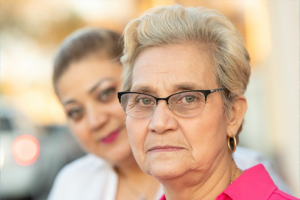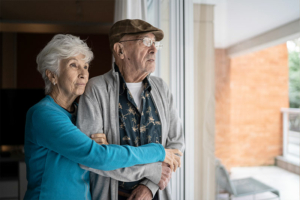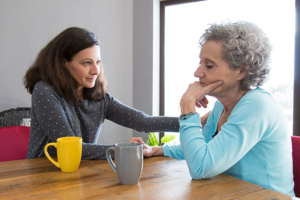Feeling Overwhelmed as a Caregiver? It May Be Caregiver Burden.

If you’re feeling overwhelmed as a caregiver, these tips can help.
Caring for a senior loved one is an act of love and devotion, but it can also feel like a nonstop marathon. The emotional highs of shared smiles and laughter can rapidly be overshadowed by the physical and mental fatigue that comes with constant caregiving. If you’re feeling overwhelmed as a caregiver, you may be at risk for or experiencing a condition called caregiver burden.
Understanding Caregiver Burden
Caregiver burden encompasses the physical, financial, and emotional toll that caregiving can take. Emotionally, the frequent worry and stress about your loved one’s well-being can lead to depression and anxiety. Physically, caregiving tasks including lifting, bathing, and moving the older adult can cause significant fatigue and strain. Financially, the costs of medical supplies, home modifications, and potentially reduced work hours can cause financial stress and uncertainty.
Social isolation is another key aspect of caregiver burden. The demands of caregiving can significantly decrease your time for social activities and connections, bringing about feelings of loneliness and isolation. This lack of personal time can also mean sacrificing hobbies and other activities that previously brought joy and relaxation.
Steps to Ease Caregiver Burden
Acknowledging the signs of caregiver burden is the first step towards dealing with it. Here are a few practical steps you can take to bring you peace:
- Care for Your Wellbeing: Make sure you’re scheduling routine check-ups and talking with a mental health professional as well if necessary, to make sure all of your health needs are fully met. Regular exercise and a healthy diet should also be a top priority to make certain you have the energy and strength needed in your caregiving role.
- Use Resources and Tools: Utilize tools such as the Caregiver Burden Scale to determine areas where you might need help. Responsive Home Care also offers a wealth of educational resources to help guide and support you while you take care of older loved ones.
- Implement Respite Care: Respite care services can offer regular, temporary relief, allowing you to take a rest and recharge. Responsive Home Care is pleased to offer respite care services that allow you to take the time away you need while knowing your family member is thriving in the care of an experienced professional.
- Seek Support: Don’t hesitate to ask for assistance from loved ones and friends. Even small tasks can make a big difference. It’s also helpful to look into a caregiver support group, either online or in person, for emotional support and tried-and-true advice from others in similar situations.
At Responsive Home Care, we offer a full range of customized home care services that provide a healthy life balance for family caregivers while enhancing the lives of older adults. A number of the ways we can help include:
- Light housekeeping and meal prep
- Friendly companionship for engaging activities and conversations
- Accompaniment to appointments and fun outings
- Personal hygiene care and support
- And more
Give us a call any time at (954) 486-6440 for more helpful tips and a senior care partner you can depend on to walk beside you in caring for someone you love. We are pleased to serve Fort Lauderdale, Hollywood, Lighthouse Point, and the surrounding areas throughout Broward County.











 If you were to list the top five emotions you experience in meeting the caregiving needs of your elderly parents, what would they be? Maybe you’d first think of emotions like love, compassion, and in some cases, even frustration or stress. Would
If you were to list the top five emotions you experience in meeting the caregiving needs of your elderly parents, what would they be? Maybe you’d first think of emotions like love, compassion, and in some cases, even frustration or stress. Would